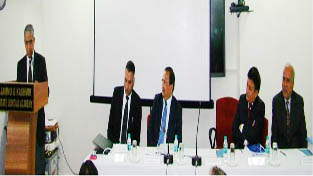
Excelsior Correspondent
JAMMU, Nov 22: Terming labour as primary and capital and entrepreneur as secondary factors in a nation’s economy, Chief Justice, Jammu and Kashmir High Court, Justice Badar Durrez Ahmed today advocated for judicious and judicial approach for addressing the issues of unorganized manpower.
He also emphasized on bringing about an attitudinal change in the society towards this most essential component of the modern economic system.
Chief Justice was addressing the Assistant Labour Commissioners, Labour Officers and Labour Inspectors of Jammu Division, after inaugurating the 2nd Phase of 5-day training programme on Labour Laws and firsthand knowledge about court proceeding, quasi-judicial proceeding and conduct of the officer in discharge of their judicial/quasi-judicial functions.
“The dignity and modesty associated with labour community has to be inculcated in our thinking and value system asserted”, the Chief Justice said while advocating implementation of labour laws in letter and spirit.
Describing issues of unorganized labourers as a matter of big concern requiring collective attention, the Chief Justice said, “we need to introspect and ponder upon the fact that human survival is possible only because of hard labour put into by these workers.”
“Let’s bring up a generation where a man doing hard physical work is equally respected as a man solving a differential equation”, he maintained. He added that a labourer must get as much as he is putting into his work.
Click here to Watch Video
Chief Justice, while expressing optimism over the successful outcome of such innovative programmes, said that this intensive training would surely take the participants through a journey in judicial ethics, various enactments and procedural codes. He exhorted upon the trainees to adopt judicious and judicial approach towards their working. He added that such events would immensely help the participants to work earnestly for protecting the labour class from any kind of exploitation thus ensuring justice for all.
The Chief Justice complimented the Judicial Academy for organizing the five day programme on different types of labour laws as the training programme will enlighten the labour officers to serve the cause of labourers and workers who deserve social justice as well as access to justice.
Chairman J&K SJA, Justice Alok Aradhe, while highlighting the laws envisaging labourers right against exploitation, said that Constitution seeks to provide that the health and strength of the workers both men and women and the children is not abused. He exhorted upon the need of weeding out wide disparity in emoluments and working conditions between contract labour and direct labour as they are not treated equally. He said that this training would enable the participants deliberate upon issues of labourers in light of various social welfare legislations.
Member, J&K SJA, Justice Janak Raj Kotwal described the cannons of judicial ethics as of utmost importance for the trainees in delivering services towards their clients. He termed investment in worker’s health as a “gift edged security” which helps in yielding immediate return in the increased production.
He also dwelt on other Acts like Maternity Benefit Act which is aimed at to ensure social justice to all women. “While dealing with social welfare legislations, the Labour courts and Tribunals have to adopt a practical approach by observing fundamental principles of natural justice,” he added.
Director, J&K State Judicial Academy, Abdul Rashid Malik, while elaborating on the significance and objective of organising this programme, said that through the events on varied subjects of importance, Academy provides a platform to all the stakeholders of justice administration including the Labour Officers to ponder upon crucial issues and exchange valuable experience and knowledge.
The working sessions of the training programme were chaired by the Resource Person, Justice Hasnain Massodi, former Judge, High Court of Jammu and Kashmir alongwith Abdul Rashid Malik, Director, J&K State Judicial Academy and Dr. G.R. Ghani, former Commissioner/Secretary.

